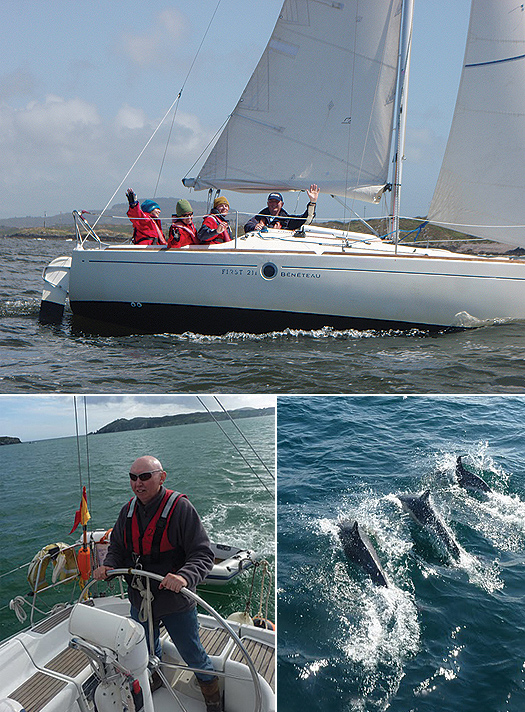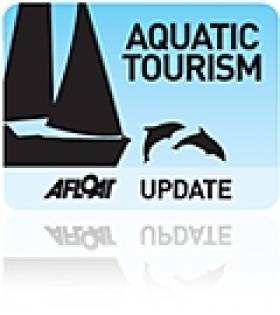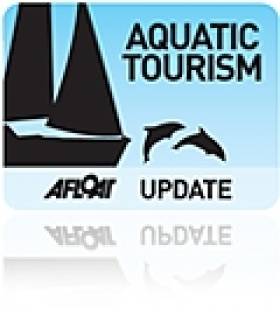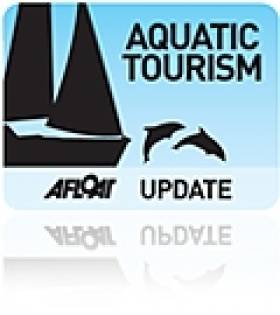Displaying items by tag: Glenans
The Legacy of Glenans and Egalitarian Sail Training in Ireland
Glenans arrived in West Cork in 1969 with a vision to offer sailing and water activities to all in an egalitarian way. For 25 years, they trained thousands of Irish people in sailing instruction, boat building, and the marine environment. However, their closure in 2010 left a void in the Irish maritime industry. In this article, former President of Glenans Irish Sector Leslie O'Hora explores the impact of Glenans' closure on the Irish maritime industry and its legacy in promoting egalitarian sail training in Ireland.
When the Glenans operations closed in Ireland in 2010 by the “accountants”, they failed to “join the dots” and see the consequences of their actions after a successful era of egalitarian sail training of 25 years.
Glenans' (ex-French Resistance) arrival in West Cork in 1969 was seen as a potential game changer in affording sailing and water activities for all in an egalitarian way. As soon as it came to pass, the Glenans' formula of voluntary instructors, base volunteers, and chefs imbued a spirit of freedom.
In addition, their way of life was very focused on the environment and eco-living before climate change appeared in the media.
Previously, the scene militated against water sports for all. A small group of civil servants in Bord Failte saw the opportunity to create new visions, break down barriers (including North South), and attract new types of visitors locally and from France.
 (Above and below) Two aerial views of the Glenans sailing base in Clew Bay in County Mayo
(Above and below) Two aerial views of the Glenans sailing base in Clew Bay in County Mayo

They backed the Glenans' vision. Soon, the base in Baltimore was joined by Bere Island and, latterly, Clew Bay in Mayo. The base in Clew Bay was the first custom-built base in these islands and followed in the success of the West Cork bases.
Throughout the 1970s, 80s, and 90s, thousands of Irish people had a maritime experience thanks to Glenans. Local people were trained in sailing instruction, boat building, the marine environment, and marine craft in general.
 Glenans sailing at Collanmore in County Mayo
Glenans sailing at Collanmore in County Mayo
Aer Lingus changed their flight times to Cork, local shops, chandlery and grocers in local economies thrived.
Then Ryanair arrived. They offered low-cost alternatives to the Glenans demographic, who at the time had not discovered Irish maritime nature. Combined with the spread of the internet, young people had other options before them.
The “accountants” panicked; the French did not understand the local trends, and the doors were closed.
Since then, the wheel has turned again; Covid introduced us all to Ireland's rich seaboard attractions and the dry suit generation was born.
But Glenans was gone though still training 14,000 people in France.
 A 1990s Glenans advertisement from Afloat magazine
A 1990s Glenans advertisement from Afloat magazine
Now we have a number of small sailing training activities (working flat out) plus summer courses in clubs that are pitifully supported by the Government.
We still have no National sail training vessel, and no conduit for young people interested in pursuing a maritime career; despite a number of government initiatives, they have still failed to deliver on our maritime potential
Appallingly, with a maritime area the size of France, we are so underdeveloped.
Glenans is more than a sailing school; it is a way of living in tune with nature and a philosophy for sharing all that is good in the world.
Perhaps it is time for the children and the grandchildren of those Glenans pioneers to pick up the baton and secure a “Sailing for All” future for this Ireland Nation.
Leslie O'Hora is a Green Party member and Seanad Election candidate He is a Yachtmaster and member of the Atlantic Youth Trust
#Tourism - A Baltimore maritime group says Fáilte Ireland's commitment to coastal tourism "rings very hollow" in light of its proposed sale of the former Glenans sail training school premises in the West Cork town.
Last September Afloat.ie reported on the decision by the French sail training group, one of the biggest such operators in Ireland, to close its bases at Collanmore and Baltimore.
The Baltimore location had operated since 1969 in a redbrick building that was once the southern terminus of the Skibbereen branch line, according to The Irish Times.
But Fáilte Ireland, which took over ownership of the waterfront property from Cork-Kerry Tourism, is "determined to put the station and allied facilities ... on the open market" for sale to to the "highest bidder", says Micheál O'Meara, chair of the Baltimore Maritime Centre/Glenua sail training group.
O'Meara adds that the decision flies in the face of Fáilte Ireland's commitment to the Wild Atlantic Way initiative, as the Old Station House "is a key anchor of the project" with potential to provide maritime education and training alongside sailing courses.
The Irish Times has more on the story HERE.
Recession Hit Glenans Warns of 'Possible Closure' of Collanmore & Baltimore Sail Training Bases
#glenans – A 'financially struggling' Les Glenans association is considering closing the doors on its operation in Ireland, according to president Michael O'Meara who signalled the potential move to members in a letter last Friday. No decision has been made yet, but it looks likely at least one of two Irish bases will close at the end of the year.
The popular sail training club has been one of the largest such organisations in the country over the past 44 years, training up to an estimated 40,000 in that period, O'Meara told Afloat.ie.
The association currently has 1,500 members in Ireland and was reintegrated with its French counterparts in November 2010, a move Les Glenans said at the time would underpin its future.
Its 2013 season brochure was launched with some fanfare in April by Leo Varadkar TD, Minister for Transport, Tourism and Sport in Dun Laoghaire, but a lack of demand for courses since has caused it to review its Irish operation. It is looking at closing bases in Collanmore, County Mayo and Baltimore in West Cork.
'There are a number of reasons for this, including (but not exclusively) the repayment of GISC [Glenans Irish Sailing Club] debt and the current economic situation in Ireland as well as in France', O'Meara said in his letter last Friday.
Though the total numbers of trainees increased in the immediate year after reintegration this initial increase was in French trainees not in Irish ones, and this has not been sustained.
Despite large investment, the 'Secteur' has continued to make a loss, O'Meara said:
Some of the reasons cited for the decline include:
· Economic crisis in Ireland and across the EU
· Very poor summer weather since 2009 - people preferring to travel abroad. This has added to the continued decline in adult dinghy and catamaran sailing.
· Prohibition on paid advertising and marketing since the integration
· Website and translation issues
The total Glénans association has also experienced poor financial performance in recent years. 2010 was the last year in which the association made a positive result.
Unfortunately,a large fraction of this cost and loss is pertaining to the Irish Secteur. The poor performance and financial results are not sustainable and if not significantly improved (i.e. increase in trainees and course sales) will jeopardise the future of the overall organisation.
As a result, there are a number of solutions presently being discussed by management and the board of directors. Whilst no decisions have yet been made, it is likely that one of the Irish bases (Collanmore) will close permanently at the end of the 2013 season.
There is also the possibility that without a swift major upturn in Irish activity Baltimore will also close at the end of the current season - thus ending the Glénans activity and presence in Ireland.
There are a number of external factors to be taken into account before any further discussion by the Les Glénans board (Conseil) can take place and before any decision can be made.
Meanwhile, the Secteur Committee has formed a working group to explore all solutions to the situation and to formulate a proposal to the board in order to ensure the continuation of operations in Ireland.
O'Meara has urged members to give their 'continued support' for the association. 'Booking in for courses and raising the profile by word of mouth and other means will increase our activity level, provide tangible support to our proposal and may have an influence in the decision making process'.
In 2009, the Irish club raised in excess of €80,000 from members and supporters. The fundraising, undertaken to help secure the clubs future, and allowed Glenans to upgrade its fleet and continue to offer high quality RYA and ISA approved sail training at its bases in Baltimore in west Cork and Collanmore in Clew Bay.
But in November 2010, members of Ireland's biggest sail training organisation, Glenans Irish Sailing Club voted unanimously to reintegrate with the French-based sailing association Les Glenans as a means of stemming losses.
The decision was designed to allow the Glenans sailing school activity to continue in Ireland at both bases in Collanmore and Baltimore, and it secured the financial future of the Irish organisation which has experienced an increasingly difficult trading environment
It was thought at the time the reintegration would reunite the two associations which share the common aim of bringing people together through a love of sailing and the sea. The idea was to give the Irish members access to Les Glenans' Europe wide sailing activities and allow Les Glenans to offer a unique Irish sailing experience to its 14,000 members.
Under the 2010 agreement Les Glenans took over the assets and liabilities of Glenans Irish Sailing Club. The Club's two Irish sail training bases at Baltimore, County Cork and at Collanmore Island, in Clew Bay, County Mayo continued to operate .
The Irish bases become part of Les Glenans network of sailing bases across France and Italy. Ireland formed one of Les Glenans five administrative sectors, with Irish members having full voting rights in the enlarged association.
Glenans Sailing School Launch 2013 Season in Dun Laoghaire
#glenans – Minister for Transport, Tourism and Sport Leo Varadkar launched Glenans 2013 season this afternoon at the National Yacht Club in Dun Laoghaire.
As Europe's largest sailing school the French club has bases in Baltimore in West Cork and on Collanmore Island on Clew bay in County Mayo.
The Minister helped the school to launch its annual Irish sales brochure.
The Irish Glenans operation was established in 1969 and was reintegrated into its French parent in 2011.
Entente Cordiale - Glenans Ireland Reunites with France
After a quarter of a century, Glenans Irish Sailing Club has been reunited with its French parent association, writes Bryan Dobson.
Well known to generations of Irish dinghy and keel boat sailors, the Glénans sail training bases at Baltimore, Co Cork, and Collanmore Island in Clew Bay, Co Mayo, are reopening this season under new French/Irish management. The merger of Glenans Irish Sailing Club (GISC) with Les Glénans of France, prompted by financial difficulties in the Irish club, was approved by the two organisations last November, securing the future of the Irish bases which now becomes Les Glénans newest secteur.
The Irish operation, founded by the French in the 1960s but independent since the 1980s, will form part of an association which trains some 14,000 people each year, making it Europe's largest sail training organisation.

"It enables GISC to become part of a financially sound organisation with the same ethos," said Emma Sweeney, who was recently elected President of the Irish secteur committee. She and the 11 other committee members will assist in the running of the Irish bases, working with the French-appointed chef de base, Tom Daune.
Daune, who was an assistant chef de base for Les Glénans at île d'Arz in the Morbihan in Brittany since 2006, says they will "continue to refresh the fleets and buildings on the two bases" and "develop more cruising activity in Baltimore", as well as looking at the introduction of windsurfing in Collanmore.
Les Glénans has already demonstrated its commitment to the Irish secteur with new boats and equipment in place for the coming sailing season. The base at Collanmore in Clew Bay has taken delivery of 18 new catamarans. In Baltimore, the fleet of specially-designed Les Glénans 570 keel boats has been overhauled and added to, with each named after one of the seven deadly sins! The Glénans moorings at Baltimore have also been extended to accommodate two newly-delivered Sunfast 32s, which will be available for sailing courses in the magnificent cruising grounds of West Cork along with club's Sunfast 37 Sherkin ll.
Tom Daune says they "hope to have some strong links between Irish and French members....to permit them to sail together and to build a common knowledge. The courses are all bilingual. The main language is English, and French will be present too. So we have to develop our franglais."
"They're just mesmerised by the Irish coast," said Emma Sweeney of the French sailors from Les Glénans that she has met. She believes the merger will result in "significantly larger numbers of people coming to Ireland to sail in Baltimore and Collanmore".
And for the first time, Ireland will have a voice at the top table in Les Glénans with the election of Sinead MacAleese to the governing board of the organisation, the Conseil d'Administration. At the association's recent AGM, she topped the poll, out of 13 candidates, to secure one of only four vacancies on the Conseil.
A member of GISC for the last ten year and now based in Prague in the Czech Republic, Sinead has lived and worked in France for the last 12 years. She was one of the team that helped negotiate the merger of the two organisations, a development which she describes as "a great opportunity for the club to grow on two fronts".
Firstly, she believes there is an opportunity to deepen the ethos of Les Glénans, which is based on sailing without borders, on friendship and on volunteerism. "Volunteering is very important, a real core value," she said. And then there is the international dimension to the merger. "This is an opportunity for France to grow internationally." Les Glénans has a number of bases in Italy but Ireland is its first fully non-French secteur. And it means Les Glénans can offer Englis-speaking sailing courses to French and other non-Irish trainees in Ireland."They are very keen on developing English speaking courses," said Paul Rossiter, who was chairman of GISC in the run-up to the merger. A key member of the Irish negotiating team, he says the French association wanted to "spread their wings" as well as "insure that Glénans activities continued in Ireland".
Tom Daune believes it will be "very exciting for French, Belgian, Italian or Spanish members to sail in Ireland with Les Glénans. It's a new sailing area with an amazing landscape...and it's a fabulous place to learn more."
Les Glénans will be running courses at Baltimore and Collanmore from April through to October, for both adults and teenagers.
And according to Tom Daune, they can expect a unique experience: "Glénans arises from the dream of a more brotherly society and from a passion for the sea...Glénans is a sailing school, a sea school and a school of life."
For Les Glénans bookings see www.glenans.ie or phone 0033 153938600 (dial 1 and 1)

































































